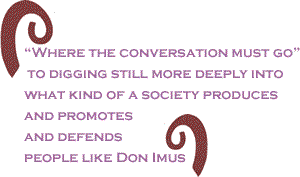
|
|||||||||||||||||||||
|
The current issue is always free to all readers If
you need the access available to a |
|
 |
|
“It didn’t start there and it definitely wasn’t going to stop there until somebody said something. That wasn’t the first thing he said out of character. He insulted Black women, women in general. Because it just wasn’t only Black women. He also insulted their team mates, the coach, their mothers. It went way beyond that, and then what about his audience. He insulted them as well. It went way beyond that.” Black hairdresser on the Southside of Chicago “How should he be able to say something like that when it’s degrading to someone else? That’s unacceptable, there’s no tolerance for that. None at all. No. Absolutely not.” Woman getting her hair done in a hair salon, Southside Chicago “I was proud of the world for the first time in a long time. People are outraged, and they should be. We cannot accept this hateful stereotyping, legitimized by Imus' position as a public commentator, as part of the social discourse. The very thought that someone would find such words humorous is upsetting and outrageous, and the Rutgers team and the public, are right to stand up and reject it.” Member of the women's volleyball team at Cornell University After Don Imus, on his April 4 radio show, called women on the Rutgers University basketball team “Nappy headed hos,” people all over the country responded with outrage. In the neighborhoods, high schools and universities, as well as the work places, Imus' racist comments sparked widespread discussion and controversy—and widespread public anger and disgust about racism and sexism in this society that do not often come to the surface like this. By April 11, MSNBC, in the face of such growing outrage, announced it would no longer simultaneously air Imus' radio show. And the next day, April 12, CBS finally fired Imus. How did this happen? Why was Imus allowed to run his racist and sexist poison for so long? And what does all this mean? Widespread Outrage
Black journalists, including some very top-level and high-profile figures, played a key role in all this. Right away, the National Association of Black Journalists issued a press release condemning Imus, calling for a boycott of his show and demanding he be fired. NABJ President Bryan Monroe, vice president and editorial director for Ebony and Jet magazines in Chicago, said, “Those comments were beyond offensive. Imus needs to be fired. Today.” When Imus was put on the Today show to give “his side” of the story with Matt Lauer, Al Roker—the Today show’s well-known weatherman—immediately went on the Today show blog to call for Imus’ firing. New York Times columnist Bob Herbert wrote, "Powerful statements were made during in-house meetings by women at NBC and MSNBC—about how black women are devalued in this country, how they are demeaned by white men and black men. White and black women spoke emotionally about the way black women are frequently trashed in the popular culture, especially in music, and about the way news outlets give far more attention to stories about white women in trouble." These journalists may have “made it” to a degree in America—but they are still subject to American racism and discrimination, both in their professions and in their lives. They acted as voices of conscience, taking the platform they have to say “no more!” and condemn this outrage. This helped change the terms of national debate. And Rev. Al Sharpton and Jesse Jackson also joined the fray. MSNBC and CBS Radio, the companies that air Imus' show, first tried to deal with the growing controversy by announcing that Imus would be suspended for two weeks. But this slap on the wrist only made many people even more angry and more determined in their demand that Imus be fired. And many people were inspired by the way the Rutgers University women's basketball team stood strong in the face of Imus' ugly attack. At a press conference, team captain Essence Carson said, "We're happy—we're glad to finally have the opportunity to stand up for what we know is right… We can speak up for women, not just African-American women, but all women.” And on MSNBC's Keith Olbermann show, the team's coach, Vivian Stringer, commented, "I really think that this was reduced to the very human element of decency, you know, to make sure that these kinds of things are stopped. I hope that it doesn‘t stop with Mr. Imus, because he‘s not the only culprit. I think that some of us as adults, as parents, are responsible for some extent, because we haven't stepped up, you know, that the corporate executives have dealt with the color of all of this being green, and it's OK. We see these things over time, you know, a kid that steals something with a plastic cap pistol, to spend 10 years in jail, and yet you see, you know, the white-collar workers, you know, thieves that steal millions of dollars."
Protest rallies occurred on the Rutgers University campus declaring that a two-week suspension was not enough and calling for Imus' firing. Hundreds of thousands of emails were sent by organizations like the Feminist Majority and the National Organization for Women, either calling for Imus' firing, or to show support for the Rutgers University women's basketball team. The NAACP issued a petition calling for Imus to be fired. There was very broad sentiment that this time, anyone who hates racism and sexism and is sick and tired of the way this is part of the mainstream media, cannot just let this blow over. That this cannot be tolerated. That Imus had to go down. All this—the outrage, the debate, the refusal to take it anymore—began to bring a lot of things about the way this society functions into the light. This outrage began to dominate the “public debate” in a way that was not so easily controlled or diverted. These are issues at the very heart of what America is all about and how it works socially day-to-day. And the way this was being debated—with the people who are oppressed by America having raised their voices and seized initiative in the discussion—was something that those who make the decisions in this society do not want. These “decision-makers”—that is, the ruling class—decided at a certain point to cool this out and send Imus packing…for now. This was a victory. As a hip hop artist on the Southside of Chicago told Revolution: “I thought it was inhuman, insensitive and I thought the guy should be fired. That’s great [the firing], that’s a triumph. It was so insulting and I just thought if that’s what happened, if he got removed, justice was served. Cause, you know, in a position of power and authority, people look up to you, certain comments are just inexcusable. So I think that was a just decision.” Imus and His Backers and Promoters “That reflects slaves, that brings back slavery. Things like that bring back slavery from back in the day. Like it’s not over with, like it’s still going on.” Student at Harold Washington College in Chicago,
Don Imus referred to his description of the Rutgers women's basketball team as a “joking remark.” But we've heard this kind of racist and sexist “joking around” before. It sounds quite literally like the kind of “joking conversations” that must have taken place between plantation owners and overseers about their slaves. And just like in the days of slavery, the point of Imus' “joke” was to demean and dehumanize Black women and to also cement the bond between his white male listeners on the basis of white supremacy and male domination. This is the kind of “humor” that has gone along with, justified and helped promote the most horrible crimes in the history of the U.S.—from the selling of slaves, lynchings and Jim Crow Laws to today's modern-day plantation system of discrimination, inequality and police brutality and murder. This is the kind of “joking” and thinking that flows out of and reinforces the horrendous and oppressive social relations—between whites and Black people, between men and women—that have been at the root of this country since its founding, and continue to be at its roots. And Don Imus is not just anybody—he has been a highly placed and highly backed major media mouthpiece. Imus has been a major figure in the whole phenomenon of “shock jocks,” who routinely promote and uphold the oppression of women and white supremacy and who whip up and promote ugliness, mean-spiritedness, and ignorance among their base of listeners. And this was not, by any means, the first time that Don Imus made such blatantly racist and sexist remarks on his show. In fact, he has a long and ugly history of making blatantly racist and sexist comments on his show. We won’t repeat here the whole litany of on-air reactionary bigoted attacks made by Imus over the course of two decades that have been documented these past two weeks in other media. The most telling exposure of all came from Imus himself, in 1998, when he bragged to 60 Minutes producer Tom Anderson that he'd hired his sidekick, Bernard McGuirk, on his show specifically to tell “nigger jokes.”
So it is no surprise to anyone that listens to or knows anything about Don Imus that he makes racist and sexist attacks on people a central part of his show And in fact, all this has not only been tolerated, but supported and promoted by not only the companies and sponsors of his show, but by various public figures, including major politicians who have appeared on his show and who don't denounce Imus for his ugly racism and sexism. For example, two Republican presidential candidates—former New York Mayor Rudy Giuliani and Senator John McCain (who have both been on Imus' show)—spoke out after the Rutgers “joke,” defending Imus and making it clear that they would continue to be on his show. Imus’ “guest list” also included Democrats like John Kerry and Joe Biden, and even Barack Obama—who weakly got on the bandwagon late in the game to criticize Imus. And again, what about the fact that Imus was fired over a week after he made his ugly comments? After the station first tried to just give Imus a two-week suspension and only after it was clear that the mass anger and demand was not dying. In other words, Imus’ “joke” was just fine with most of his corporate sponsors and with MSNBC and CBS Radio for a full week. And his whole history of similar jokes had been fine with them for decades. None of the forces that have supported and backed Imus and have now been forced to fire him have been motivated by anything other than cooling this down and defending their larger interests and agenda. Many corporations eventually pulled their sponsorship of Imus, including Staples, General Motors, Sprint Nextel, GlaxoSmithKline, Procter & Gamble, PetMed Express, American Express and Bigelow Tea. But why do corporations sponsor this and other racist and sexist talk shows in the first place? Why are open promoters of racism and sexism made into stars at the highest levels of TV and radio and given such a huge public forum to spout their poison—with key ruling class figures, Republicans and Democrats, going on his show and lending him credibility? It is not “just about the money”—it is the fact that Imus fits into a larger agenda. As we noted above, Imus fits into the whole range of “shock jocks” like Rush Limbaugh, Michael Savage, and so on down the line. This whole thing was brought forward to cement a reactionary, white supremacist and male supremacist outlook as the most aggressive and widespread outlook in society. All this “white male bonding” was done in particular in an attempt to erase or demean all the lessons that had been learned through the great struggles of the 1960s about the real character of this society; and to ridicule and then reverse the change in values that had begun to come about in response to that knowledge. The values of the '60s morality—for equality, for questioning authority, against racism and imperialism and sexism, and against, in particular, the unquestioning patriotism and proud ignorance that had been hammered into people—were a bone in the throat of this ruling class. This system did NOT and CANNOT eradicate the ills that people fought against during those days, and anything that would send people in the direction of continuing to fight against them and going further to actually put an end to them poses a mortal threat to the powers-that-be. These so-called shock jocks like Limbaugh and Imus were a big part of a whole campaign of “reversing the verdicts.”
Imus played his own role in all this. Apparently, he was the “thinking man’s bigot” and drew all kinds of liberal authors and commentators onto his show who never challenged him. Apparently, they told themselves it was harmless—harmless to lend legitimacy and a (fairly thin) patina, or surface gloss, of intellectualism to this racist ignoramus. This role of Imus was particularly insidious—but, again, it was a role in a larger agenda. The fact that some of those who have backed Imus for years are now criticizing him and have been forced to fire him, doesn't change any of this. Where the “Conversation” Must Go Even as all this was going on—and particularly with greater intensity now—some ruling class forces, and others, were trying to justify Imus on grounds that rappers use the same ugly and hurtful words. To those who argue that Imus is being “victimized,” that he shouldn't be blamed and that the real problem is hip hop and rap because they are full of the N word and sexist and degrading portrayals of women—it should be pointed out that this racist and sexist shit predates gangster rap by several centuries. The insult “ho”—which is simply a short version of the very, very old word whore—emerged a very long time before hip-hop, and is bound up with the oppression of women, and the controlling of their sexuality by men. And the insult “nappy”—that Black people's hair is ugly because it does not conform to white beauty standards—is hundreds of years old and bound up with the continual and pervasive oppression of Black people in this society. It is very harmful when artists from among the oppressed themselves take up and promote this outlook by demeaning women in songs and videos and other forms of popular culture, and this has a very demoralizing effect very broadly in society. But that is a reflection of the oppression of Black people and of women, and it mainly shows that some among the oppressed have taken up the thinking of their oppressor (and that those who have, it should be noted, get promoted in opposition to those who won’t). This is bad, and hurtful to the people, and yet another reason why only the bottom-to-top change of revolution can even begin to get at this deeply woven fabric of oppression. And yes, it should be opposed—and it should be stopped, now. But such backward expressions among the people are in no way equal to what Imus represents—a ruling class mouthpiece spouting venom to a huge audience and given approval and support from all kinds of powerful and highly placed forces in society. And to equate the two takes the fire off where it needs to be directed.
“Where the conversation needs to go from here” is NOT to censoring hip-hop, nor still less—as the reactionary Republican ex-Congressman Tom Delay would have it—to firing someone like Rosie O’Donnell, who speaks out courageously against the reactionary ignorance and fascist obedience promoted by the Christian fascists. “Where the conversation must go” is to digging still more deeply into what kind of a society produces and promotes and defends people like Don Imus. And what must be done to change it. Click here to send comments to Revolution Newspaper. |
|
| Home | |
| April
19, 2007 Issue 226 |
||||||||||||||
|
||||||||||||||
| Printer Friendly Version in resizeable plain text format | ||||||||||||||
 |
||||||||||||||
|
||||||||||||||
 |
||||||||||||||
 |
||||||||||||||
 |
||||||||||||||
| |
||||||||||||||
| |
||||||||||||||




































